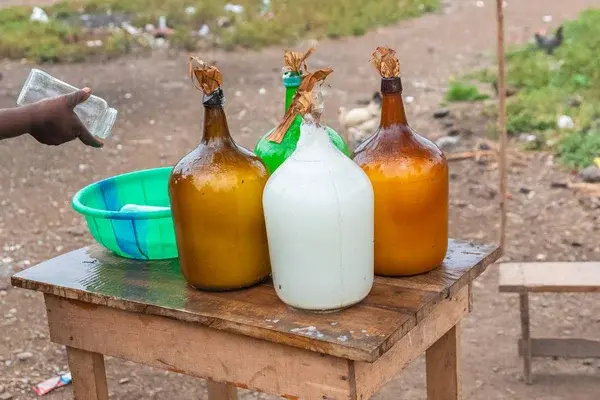Consumer acceptance of fermented palm wine made from palm trees is growing due to its natural and impressive health benefits. Palm wine is an alcoholic beverage produced from the sap of various species of palm trees such as the palmyra, date palms, and coconut palms. It’s rich in antioxidants, which help fight free radicals and other toxins that can cause damage to your body, so it’s good for people who already suffer from diseases like cancer or heart disease.
Palm wine also boosts your immune system because it contains vitamin C, one of the most important vitamins for fighting infections, and is loaded with manganese, which helps build new red blood cells. It also aids digestion because it contains lots of fiber that helps move food through your digestive tract more quickly than normal — which means you’ll feel fuller faster!

Health Benefits Of Palm Wine To The Body
Rich in antioxidants
The antioxidants found in palm wine are good for your body. Antioxidants help prevent cancer, heart disease, and aging. Palm wine contains high levels of vitamin C which helps to reduce inflammation in the body and lower blood pressure according to researchgate.
Palm wine has been consumed for centuries as a source of nourishment and energy with traditional diets consisting mainly of fruit juices or water with some added salt. It is believed that these drinks have helped promote good health by providing essential nutrients such as vitamins A & B6; potassium; magnesium; calcium; iron etc., all needed by our body daily.
Boosts immune system
Palm wine is rich in Vitamin C, which is essential for the immune system. It also contains a lot of minerals and vitamins such as B1 and B6 which help us fight against diseases like cancer and diabetes.
Palm wine has antioxidants that help to reduce inflammation in the body, especially when you are feeling sick or tired. National Library of Medicine research has shown that these antioxidants help prevent heart disease by reducing bad cholesterol levels in our bloodstream.
It contains polyphenols – these are natural compounds found in fruits and vegetables which have anti-inflammatory properties similar to those found in ibuprofen or aspirin tablets but without side effects like stomach upset or bleeding ulcers caused by aspirin usage. Polyphenols antioxidants can also reduce oxidative stress-induced damage to cells leading to premature cell death due to age-related diseases such as atherosclerosis/heart attack risk factors etcetera.
Aids digestion
Fixing digestion issues is among the impressive health benefits of palm wine. Consuming this local drink goes beyond helping with digestion to preventing constipation, which is a common problem among people. It also reduces flatulence, which can lead to bloating and abdominal pain. The alcohol content of palm wine is about 4–4.5% as revealed by the Encyclopedia of Food Microbiology making it relatively low compared with other alcoholic drinks so it doesn’t have any adverse effects on your liver or kidneys when consumed in moderation. By moderation, it means you must not consume more than 2 cups of palm wine.
Palm wine is rich in antioxidants, especially vitamin C (ascorbic acid), which has been shown to reduce the risk of heart disease and cancer by helping prevent cell damage caused by free radicals or “unfriendly” molecules produced during metabolism within our bodies throughout life as we age. Vitamin C also works as a coenzyme involved in producing collagen synthesis within our bodies so it supports healthy bones as well!
It’s good for nursing mothers
- Frontiers in Food Science and Technology researchers found that palm wine is a good source of iron, which helps with the development of red blood cells.
- Palm wine also contains calcium and potassium, which are needed for healthy bones and teeth.
- Palm wine contains vitamins B1 (thiamine), B2 (riboflavin), and C, which support healthy skin and hair growth as well as immune function.
However, scientific evidence does not support pregnant women ingesting palm wine because of its alcoholic content which is harmful to the fetus. Women who just gave birth to babies can take freshly tapped palm wine to increase serum prolactin levels and treat lactation failure study reveals. Prolactin is a polypeptide hormone responsible for lactation, breast development, and hundreds of other actions needed to maintain homeostasis.
If you are a pregnant woman, and craving for palm wine drink, endeavor to consult your doctor before making a decision.
Prevents hypertension
Palm wine can help reduce high blood pressure. It is rich in potassium, which helps regulate the body’s blood pressure by balancing sodium levels in your body. Magnesium also helps lower blood pressure by relaxing muscles throughout your body. Additionally, palm wine contains antioxidants, that can help reduce the risk of heart disease and stroke.
More ways palm wine Is beneficial to your body
Palm wine is beneficial in so many ways. It’s good for your health, it’s good for your skin, it’s good for your hair, it’s good for your nails and bones. Palm wine also has a lot of vitamins and minerals that can help strengthen eyesight or improve heart health.
One research revealed that palm wine has been used as a remedy for sore throats and coughs by South African natives since ancient times due to its anti-inflammatory properties which make it useful in treating these conditions as well as other minor ailments such as colds or allergies when taken internally or applied topically on the skin.
When it comes to alcoholic beverages, palm wine has comparatively low fat or calories making it a suitable option for those watching their weight. However, Palm wine may not be suitable for regular consumption by people who are obese or those living with diabetes as Dr. Chioma Awuzie, the Chief Lecturer of the Department of Science Laboratory Technology, Federal Polytechnic Oko found it has a fat content of about 0.100%.
Final note…
Palm wine is a healthy alternative to other types of alcohol. It’s high in antioxidants, which help your body fight off disease, lactate adequately, and stay healthy. It also contains a variety of vitamins and minerals that can help you maintain a healthy immune system and body generally.









